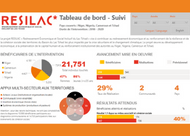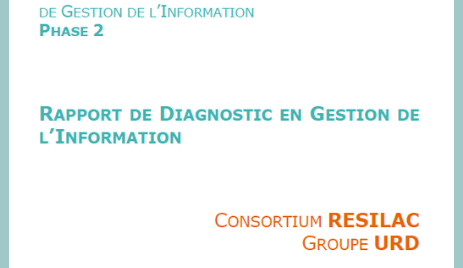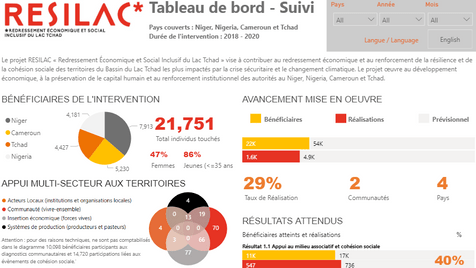Two years of support to the RESILAC project

Since 2019, CartONG has been accompanying the regional RESILAC project in structuring and strengthening its information management (hereafter also referred to as “IM component”). The project embodies the multi-country, multi-sector, and multi-stakeholder approach in a single large-scale initiative in a changing and volatile implementation context. In this regard, the IM component is key to enabling agile decision-making and visualizing project impact, but has proven challenging to implement.
What is the RESILAC project and consortium?
The RESILAC project (“Inclusive Economic and Social Recovery of Lake Chad”) contributes to the economic recovery and the strengthening of the resilience of the territories of the Lake Chad Basin most affected by the security crisis as well as climate change, among others, by strengthening the capacities of institutional actors in Niger, Nigeria, Cameroon and Chad.
Co-funded by the European Union (Emergency Trust Fund for Africa) and the French Development Agency (AFD) for a period of 4 years (2018-2021), the RESILAC project is implemented by an international consortium including Action contre la Faim (lead), CARE and Groupe URD, in partnership with the CCFD – Terre Solidaire network, Search For Common Ground as well as local organizations in the countries of intervention.
On the Information Management component, CartONG works closely with Groupe URD, the project’s learning partner in charge of the knowledge management component. The objective is twofold: i) to provide a better understanding of the issues in the intervention zones thanks to a territorial approach, and ii) to feed the project’s management process thanks to better access to monitoring and evaluation data.

Conducting an initial Information Management needs assessment in summer 2019
During the start-up phase of the project, the regional RESILAC project identified the need to improve its information management. Aware of the complexity of the subject, it opted to request support from a specialized actor to accompany it in its approach. CartONG was thus asked to carry out an IM needs assessment for the RESILAC project with the objective of: i) formalizing the needs of the stakeholders, ii) identifying the existing constraints and opportunities and iii) proposing solution scenarios. In a second phase, CartONG would implement the recommendations presented in the diagnostic phase and work on building capacity among the RESILAC project teams.
The IM needs assessment was conducted between May and August 2019, based on a summary produced by CartONG defining the framework and main issues of the assessment (identification of stakeholders, consortium organization vis-à-vis information management, constraints, strengths and weaknesses of current practices). This was then complemented by a more in-depth collection of information from the stakeholders. The data collection methodology was developed by CartONG, which then provided remote support to the project’s MEAL (Monitoring, Evaluation, Accountability and Learning) team to collect the data needed for the assessment at the regional level and in three of the four intervention countries (Niger could not be included at the time for security reasons). These data were then reviewed and analyzed jointly by CartONG and the consortium in order to propose areas of improvement and ways of structuring the IM component within the RESILAC project. CartONG’s role in this needs assessment phase was to help the stakeholders prioritize and build an action plan adapted to the context and their needs.
Following the assessment, it was jointly decided to prioritize the IM component improvement work at the organizational level (processes, documentation, etc.) in order to provide a framework for the operational activities carried out subsequently within the framework of the project. Thus, in order to facilitate efficient and centralized data sharing and aggregation, the following recommendations were made:
- Design a minimal consortium-wide IM framework,
- Clarify roles and responsibilities for data management across the consortium,
- Develop a data culture, via awareness-raising sessions with operational teams.
From a more operational point of view, it was recommended to concentrate efforts on elements that would avoid duplication or loss of data and facilitate project management, namely:
- The development of shared databases at the direct beneficiary individual level, to initiate a centralized approach,
- Producing a visual consolidation of key data in the form of a dashboard,
- The introduction of very simple tools allowing a first cartographic visualization to foster the beginnings of a territorial approach.
Review of the achievements from the end of 2019 and the end of 2020*
*It should be noted that this support was entirely done from remote, due to security reasons in the Chad Lake Basin and the Covid-19 crisis.
Within the framework of this project, CartONG is truly committed to providing long-term methodological support to the consortium members, through three main axes: i) guiding the action plan, ii) developing the skills of its interlocutors, and iii) providing one-shot technical support to facilitate the direct implementation of the project when being solicited by the members of the RESILAC consortium on a specific aspect.
In addition to the strategic support and the implementation of an action plan, directly resulting from the IM needs assessment, CartONG was able to guide the members of the consortium on certain strategic and methodological aspects, such as the verification of the level of application of data protection laws, or the review of the operating processes (role, access, etc.) of the Drive tool used for file sharing. This support took the form of written recommendations and guidelines (given the remote factor), leaving it up to the consortium members to carry out the recommended changes.
At the same time, CartONG also supported the consortium members in the implementation of a system for centralizing and reporting national data through a database system that allows for the assessment of all services provided to each beneficiary. This support resulted in the design of unique national databases, the creation of procedures and processes for their management and the remote training of MEAL teams in their use.
CartONG also designed a regional dashboard for the project based on the PowerBI data visualization tool. This dashboard is based on a pre-existing reporting file and allows NGOs and donors to visualize the project’s achievements. Note that the RESILAC project dashboard is publicly accessible and the visualized data is automatically updated on a weekly basis.

Finally, in 2020 CartONG had planned to conduct data literacy training activities for MEAL focal points and regional and national coordinators of the consortium. This training, planned as a face-to-face session, could not be held due to the Covid-19 pandemic. It will be adapted to fit the current context and is now planned for 2021.
What will happen in 2021?
In 2021, CartONG plans to continue to provide flexible methodological and technical support to the consortium members, adapted to the needs of the RESILAC project, in close collaboration with the local partners.
In addition to the reinforcement activities already carried out and following a sequential coherence of support, the actions planned for this year will include, among others, training to improve data literacy within the project, support for the analysis and visualization of project data and training on the creation of maps from the data collected within the framework of the project. Depending on the evolution of the health crisis, these last two actions should be carried out face-to-face, during the regional preparatory workshop for the mid-term review of the project to be held between June and July 2021.
In parallel, CartONG and the regional RESILAC project plan to jointly conduct: i) an update of the project’s monitoring dashboard to include results and impact indicators and ii) the continuation of efforts to centralize the databases, through data analyses and cross-visualizations of the data.
Furthermore, the complexity of the RESILAC project and the difficulties CartONG faces in providing this remote support represent a unique learning opportunity for the humanitarian aid sector. Therefore, the second quarter of 2021 will be dedicated to capitalizing on this experience, in order to draw useful lessons learned for all actors for the sector.



